Tastemakers: Poly dropout turned foodpreneur selling Indonesian food and gourmet bak kwa
Sign up now: Weekly recommendations for the best eats in town
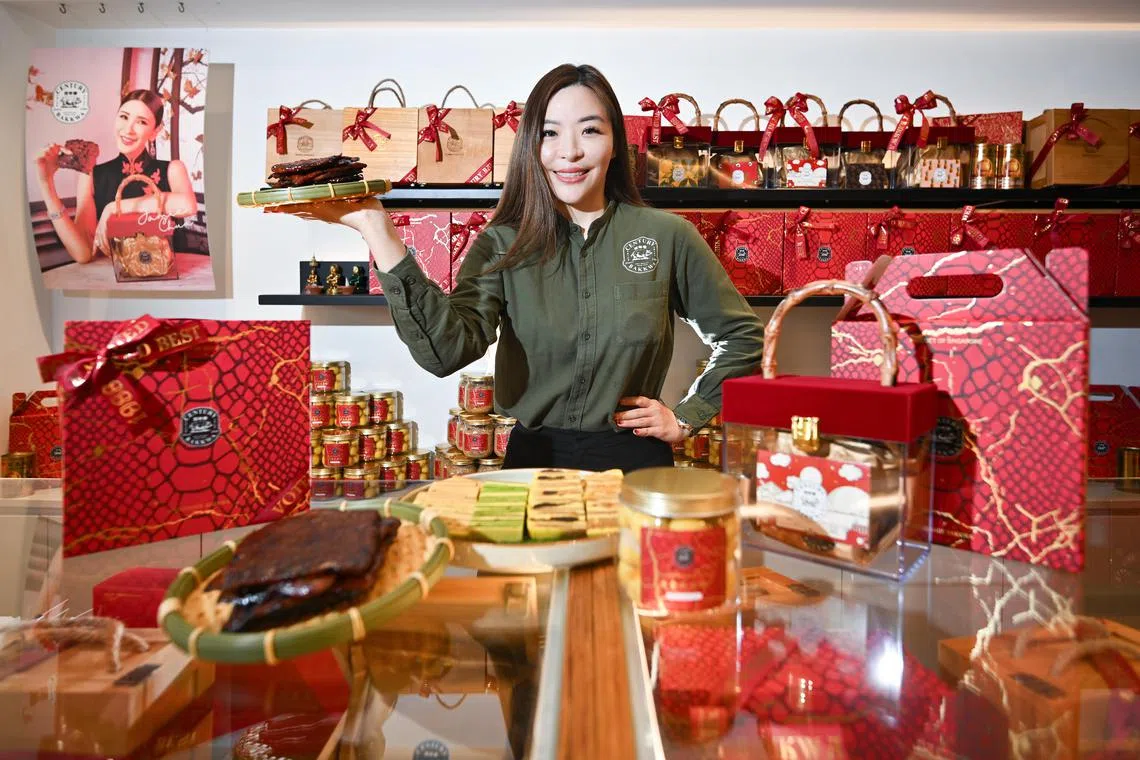
Ms Simbian Chua is the owner of Century Bakkwa, which sells the barbecued meat in traditional and unusual flavours, such as pineapple.
ST PHOTO: LIM YAOHUI
Follow topic:
SINGAPORE – Ms Simbian Chua was living the high life as the co-owner of a popular nightclub in Indonesia’s Makassar, where she rubbed shoulders with the port city’s tycoons and politicians. Then came Covid-19 and the Singaporean closed the club and reinvented herself as a foodpreneur.
In September 2020, six months after closing the club, she started home-based business Indocin selling Indonesian-Chinese food. Her business was such a hit, it quickly scaled up within two months to become a cloud kitchen. Revenue in its first year was $40,000 shy of a million.
But it was a very different story when the pandemic hit and she had to close the sprawling three-storey nightclub, Hexagon Club. She was taunted online for it.
The 33-year-old recalls: “Owning a nightclub is like having a Ferrari. When you no longer have it, everyone thinks you have fallen on hard times. I lost friends who used to be close to me because they wanted my connections.”
Rumours swirled that she was in a financial bind and gossip intensified when she began selling nasi padang out of her home.
Detractors predicted that her high-society friends would avoid her now that she had to peddle food for a living, while others bombarded her with private messages to ask if she was broke.
Ms Chua was used to being bullied in school because she had a cleft lip – she had her third and final surgery to fix it when she was 24 – so the toxic comments to her were like water off a duck’s back.
She was also not put off by the hard work required to run a food business. At 13, she started putting in six-hour shifts almost every day at a fast food restaurant, earning $3.30 an hour to supplement her daily pocket money of 50 cents. To go to work, she lied to her parents that she had to attend remedial classes.
Although her family was well-to-do, her parents kept her allowance low so as not to spoil her. Before they retired, her father ran a successful company selling toilet cisterns and her mother helped him.
After graduating from Bedok Town Secondary School, she enrolled in Temasek Polytechnic’s diploma in interactive media informatics.
She was by then running her first business selling chicken wings at a coffee shop in defiance of her father, who told her that she could only be a hawker because of her poor grades. Because she cut too many classes and failed too many modules while tending to her business, she dropped out of polytechnic after a year.
She recounts that at that time, the starting pay for a fresh polytechnic graduate was around $1,800. Her chicken wing business was bringing in $2,000 after deducting operating costs, so “I was not motivated to study since I was already earning a fresh grad’s pay”.
She later took on a series of jobs in the food and beverage industry, from cook to operations manager at different restaurants.
In 2016, she visited Makassar when a former secondary school friend, an Indonesian living there, invited her over. He suggested she start a nightclub there as the city had limited nightlife options to meet a growing demand. She roped in two other Indonesian friends, also from Makassar, to partner her in this venture, each of them investing $200,000.
They opened Hexagon Club in 2017, with Ms Chua taking charge of operations, shuttling between Singapore and Makassar, where she spent one week each month.
When the pandemic struck in 2020, like many others stuck at home, she joined the trend of cooking and posting photos of her homemade dishes on Instagram.
“I missed Indonesian dishes such as sambal petai with egg and beef rendang, which my staff at the nightclub used to cook for our staff meals,” recounts Ms Chua, who is married with two children, six-year-old son Leo and one-year-old daughter Lisa. She declines to reveal more about her husband.
She began cooking the food she craved. Some of her Indonesian friends in Singapore urged her to sell her food.
When Indocin opened for business, she was slammed with 150 orders for nasi padang within 30 minutes. Priced at $48 for a box for two, it comprised tempeh, chilli squid, ayam penyet, sambal telur, sambal petai, corn fritters and turmeric rice.
Ms Chua tapped her then 30,000 followers on Instagram. Business was brisk and, two months later, she invested $8,000 to move her operations to a cloud kitchen in Kembangan, hiring two cooks and a packer.
Today, she has 61,400 followers on Instagram and 20,400 on TikTok.
In August 2021, she started another food venture, Century Bakkwa, at a 1,000 sq ft shophouse in Dunlop Street, selling handmade charcoal-grilled bak kwa.
Someone had sent her a packet of bak kwa for Chinese New Year that year. She was so impressed with it, she found the seller and ordered 300kg to sell to her Indocin customers.
As the bak kwa master worked alone, Ms Chua had to help him grill the bak kwa for two weeks to fulfil her own order.
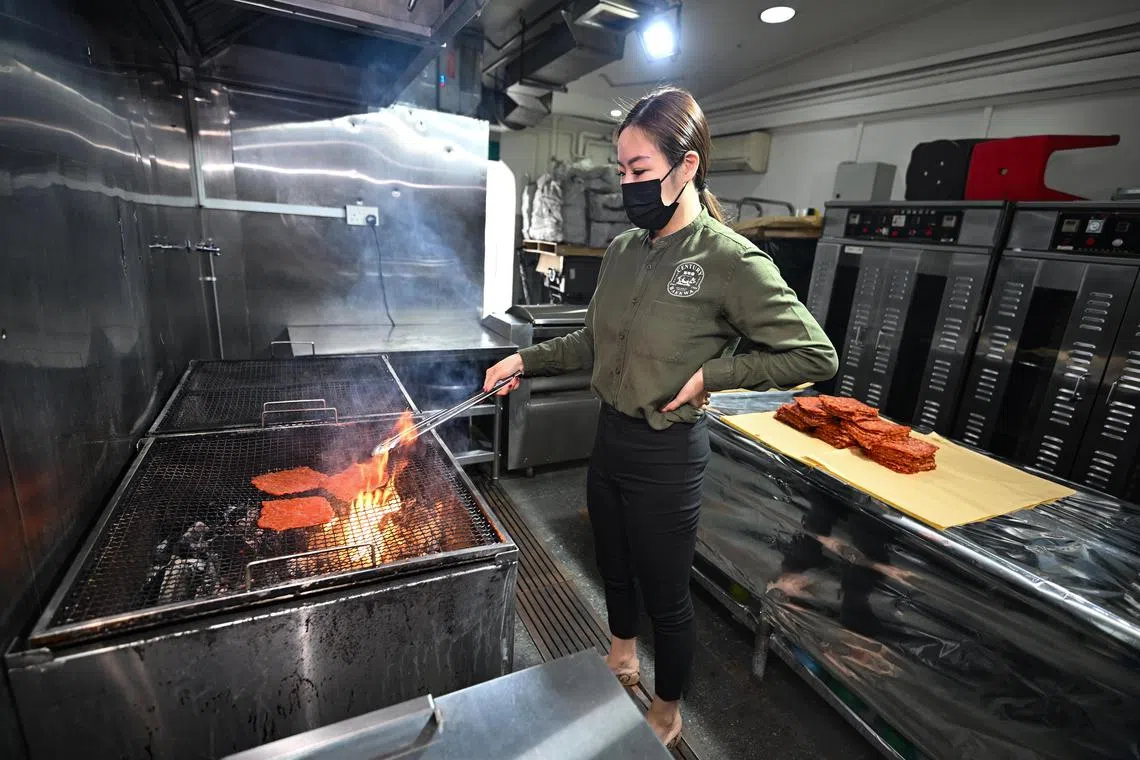
Ms Chua Simbian grilling bak kwa over a charcoal grill at the kitchen of Century Bakkwa.
ST PHOTO: LIM YAOHUI
During her stint there, he offered to sell her his recipe for $1 million as he wanted to retire. After negotiations, she agreed to pay him $500,000 for his recipe and on-site training for one year.
She spent another $100,000 to set up a bak kwa store and kitchen operations at the Dunlop Street shophouse and hired two cooks.
Ms Chua, who alone holds the recipe, uses Spanish pork for her bak kwa.
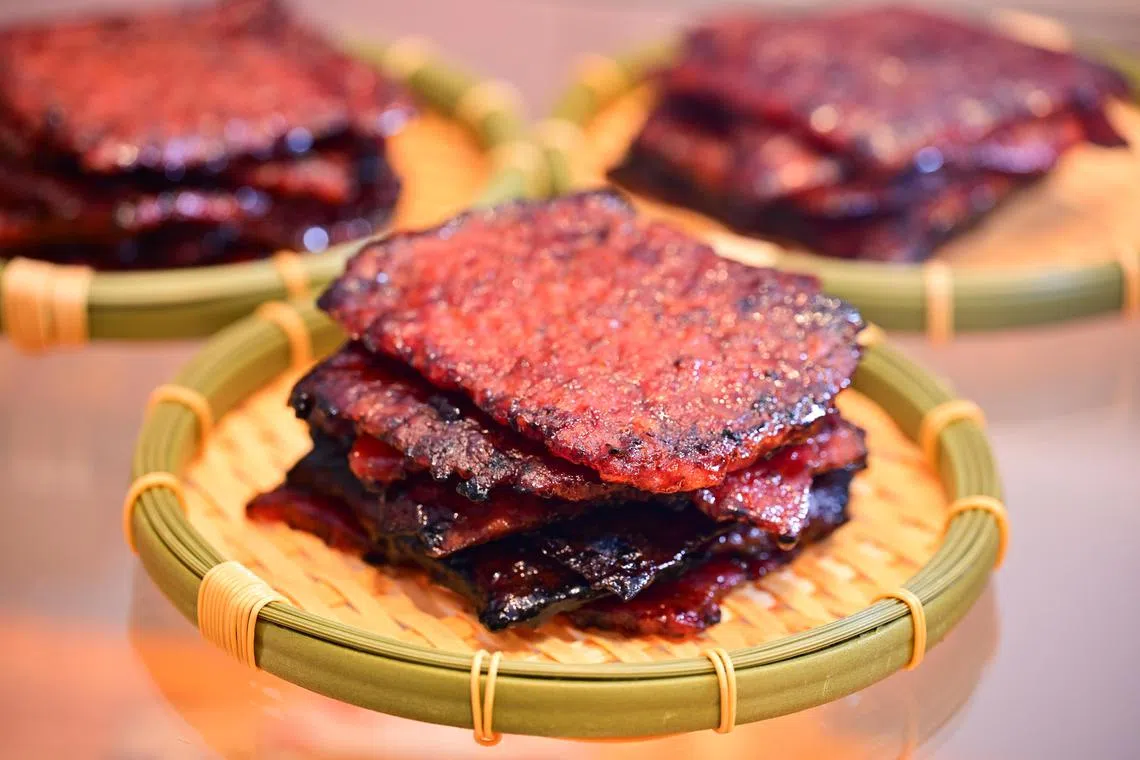
Century Bakkwa sells traditional bak kwa as well as bak kwa in unusual flavours such as pineapple.
ST PHOTO: LIM YAOHUI
Until today, the bak kwa is made in small batches of 20kg and she personally marinates each batch to control the quality. Each slice is moulded by hand.
It took two years for the business to break even, but she does not regret paying for the recipe.
In the beginning, things were quiet because it was an unknown brand, so Ms Chua drummed up business by launching unusual flavours from yuzu to truffle. Her innovations struck gold and, in 2023, Century Bakkwa was named one of five best bak kwa in Singapore by lifestyle publication Tatler Asia.
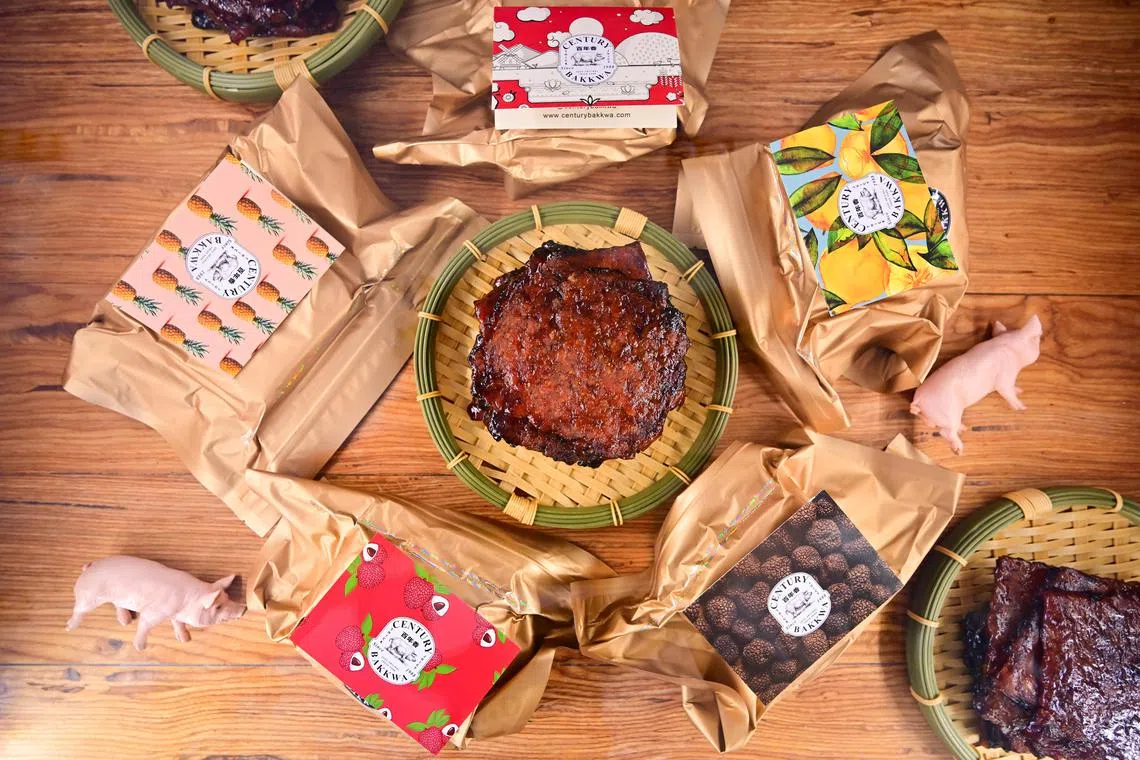
Century Bakkwa sells a selection of gourmet bak kwa, from traditional to fancy flavours such as yuzu and truffle.
ST PHOTO: LIM YAOHUI
Her current annual production is 16,000kg a year, which includes corporate orders. She hopes to hire four more workers in 2025 to double the output.
Prices of the gourmet bak kwa at her shop start at $48 for 500g of Tradition Bakkwa and go up to $88 for 500g of Truffle Bakkwa.
Also in 2023, she rented the shophouse unit next to Century Bakkwa and moved her Indocin cloud kitchen there, consolidating her food business operations with 13 staff.
With the move, she launched new items for Indocin’s menu, such as Naise Bakar. The name is a play on the dish nasi bakar – rice and ingredients such as chicken wrapped in a banana leaf, with the parcel grilled before serving. Indocin offers four flavours: Ayam Petai (chicken with petai), ayam (chicken), beef, and sotong, priced at $13.90 each. It also has a Naise Bakar Set ($63), which can feed five.
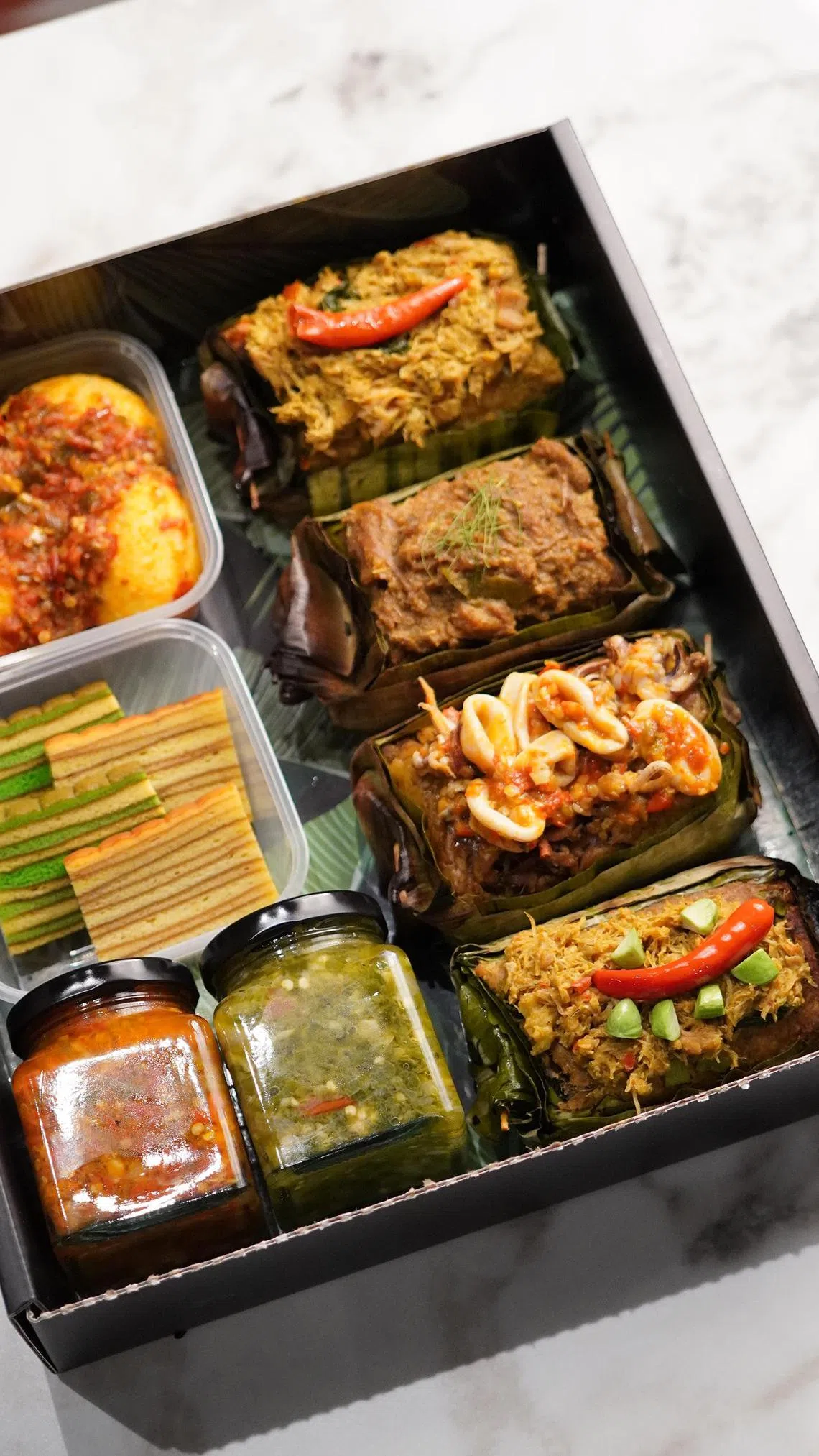
Indocin’s Naise Bakar sharing set, which includes Demon Chilli Eggs, Homemade Sambal Sauces and Kueh Lapis.
PHOTO: INDOCIN
In 2025, she is planning to take Indocin to Batam and open two franchise outlets with dine-in facilities.
She says: “Having to close my nightclub was one of the lowest points in my life. I lost my identity and my friends. But running a food business has given me a new lease of life. Most importantly, my parents objected to me running a nightclub, but now they enjoy the food from Indocin and are proud that I have found my own way despite dropping out of polytechnic.”
Hedy Khoo is senior correspondent at The Straits Times. She covers food-related news, from reviews to human interest stories.
Tastemakers is a new personality profile series on food and beverage vendors who are creating a stir.


